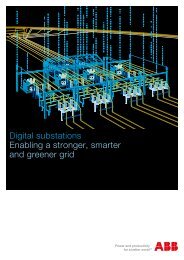ABB Review 4-2014_72dpi
ABB Review 4-2014_72dpi
ABB Review 4-2014_72dpi
Create successful ePaper yourself
Turn your PDF publications into a flip-book with our unique Google optimized e-Paper software.
1 Overview of <strong>ABB</strong> smart grids pilot projects in Germany<br />
3<br />
2<br />
1 Econnect<br />
2 Green2Store<br />
3 GRID4EU<br />
4 RiesLing<br />
5 SmartArea<br />
6 MeRegio<br />
7 T-City Smart Grids<br />
5<br />
1<br />
6<br />
7<br />
4<br />
Focus areas<br />
Energy management<br />
Energy storage<br />
Distribution grid automation<br />
The capacity of distribution feeders<br />
is defined by national or local<br />
grid codes and current practices<br />
of distribution system operators.<br />
However, several factors, such as thermal<br />
rating; voltage regulation; fault levels; power<br />
quality; reversal power flow and islanding;<br />
and protection schemes limit hosting<br />
capacity and many countries have proposed<br />
possible methods of overcoming<br />
this limitation [1]:<br />
– Changing the topology of the grid,<br />
grid enforcement and/or new<br />
installations<br />
– Short-circuit current as an ancillary<br />
service<br />
– Voltage regulation and reactive power<br />
compensation<br />
– Power control of distributed<br />
generators<br />
– Adaptation of protection schemes<br />
– Future options such as wide-area<br />
control, storage, load management<br />
and active elements<br />
In Germany, the electricity system has<br />
been designed with high reserve capacities,<br />
meaning many grids can host additional<br />
generation. However, for most<br />
grids a limiting factor concerning grid<br />
capacity is voltage level. On top of this,<br />
fluctuations in wind speed and solar irradia<br />
tion lead to fast voltage changes. Under<br />
these conditions, keeping the voltage<br />
within defined boundaries and avoiding<br />
flickers becomes quite a challenge. To<br />
Pilot projects with grid operators and<br />
academia 1 have resulted in innovative<br />
solutions from <strong>ABB</strong> to operate and constabilize<br />
voltage and provide reactive<br />
power from distributed generators, grid<br />
operators in Germany mainly consider<br />
two guidelines for compliance to their local<br />
grid code:<br />
– The technical guideline from the<br />
German Association of Energy and<br />
Water Industries (BDEW) concerning<br />
The high penetration of<br />
distributed generation<br />
puts increased pressure<br />
on maintaining and even<br />
increasing reliability and<br />
availability.<br />
the connection of plants to the<br />
medium-voltage network; the guideline<br />
is applicable to all generators with<br />
a capacity of 100 kW or higher [2].<br />
– Compliance with the VDE networkconnecting<br />
regulation, VDE-AR-N<br />
4105, is mandatory for all generators<br />
with an installed capacity below<br />
100 kW [3].<br />
The German Renewable Energy Act of<br />
2012 requires all distributed generators<br />
with a capacity higher than 30 kW to participate<br />
in the feed-in management of the<br />
distribution system operator, who can<br />
then reduce active power by remote control<br />
in case of grid stability problems. In<br />
August <strong>2014</strong>, the new Renewable Energy<br />
Act became effective, enhancing participation<br />
of distributed generation in the market<br />
and encouraging a reliable forecast<br />
of generation [4]. New European network<br />
codes prepared by the European Network<br />
of Transmission<br />
System Operators<br />
for Electricity<br />
(ENTSO-E) are<br />
currently in the process<br />
of becoming<br />
European law [5].<br />
In its “Ancillary Services<br />
Study 2030”<br />
the German Energy<br />
Agency, dena,<br />
says that the very<br />
high penetration of<br />
distributed and renewable resources requires<br />
a new systemic approach for the<br />
development of the whole energy system<br />
over all voltage levels [6].<br />
Footnote<br />
1 In partnership with grid operators such as<br />
RWE Deutschland AG, Westnetz, E.ON Mitte,<br />
STAWAG, Stadtwerke Duisburg, Netze BW<br />
and EnBW ODR, and academia such as<br />
TU Dortmund and Stuttgart University.<br />
30 <strong>ABB</strong> review 4|14



